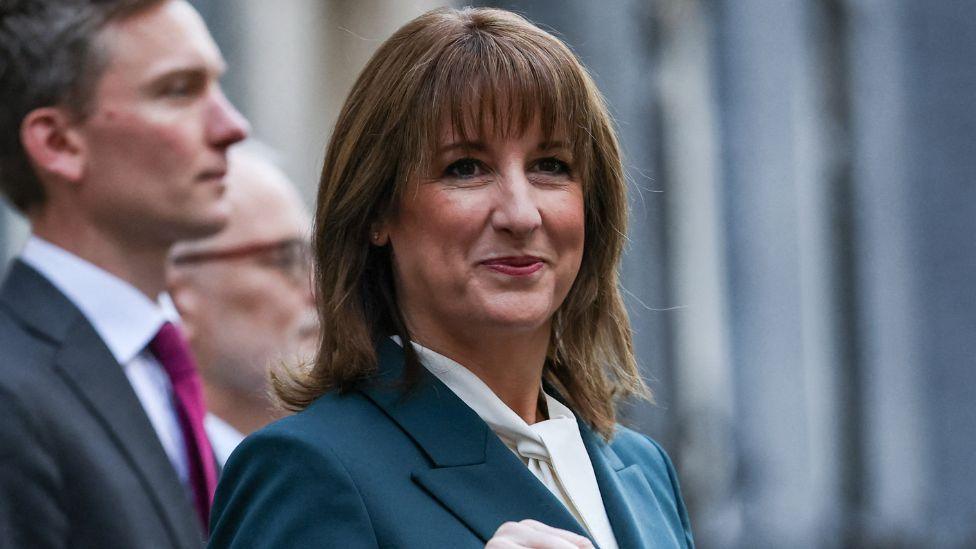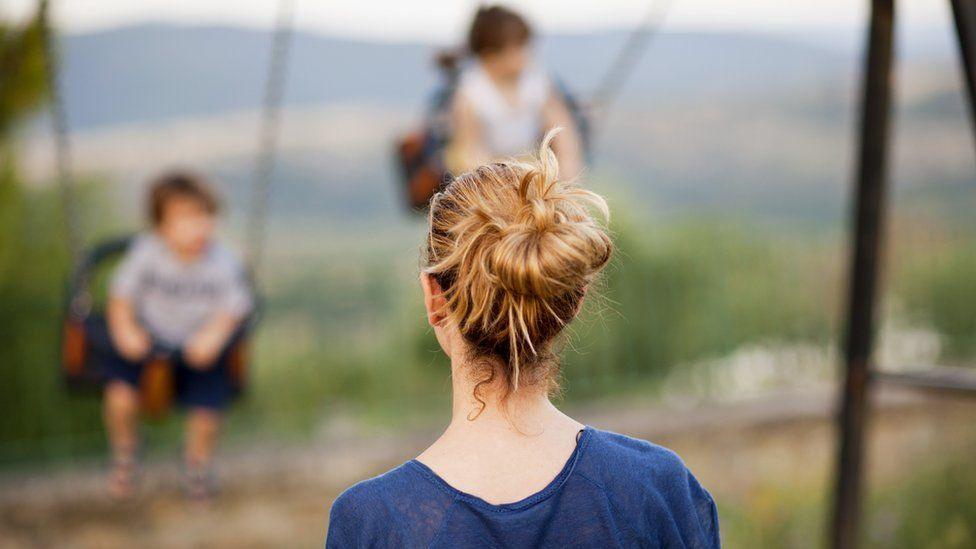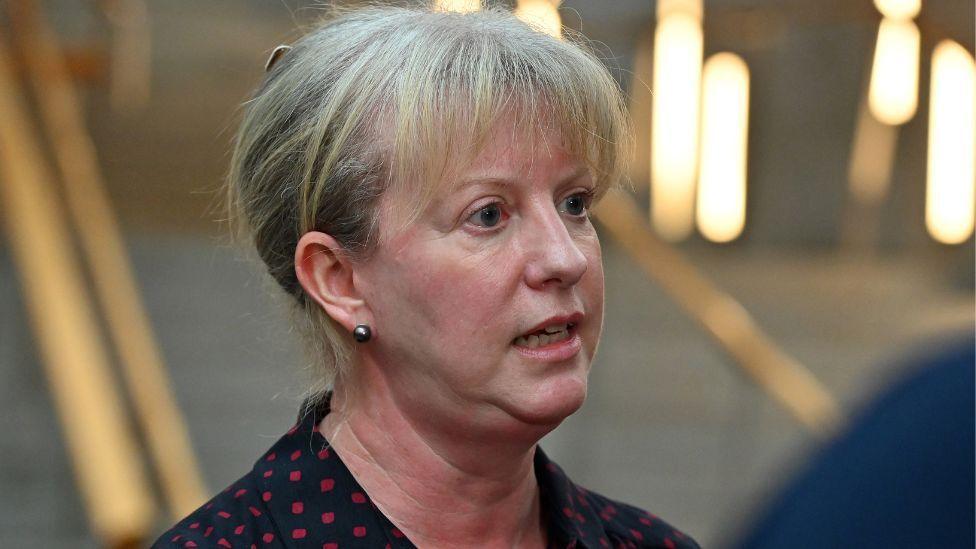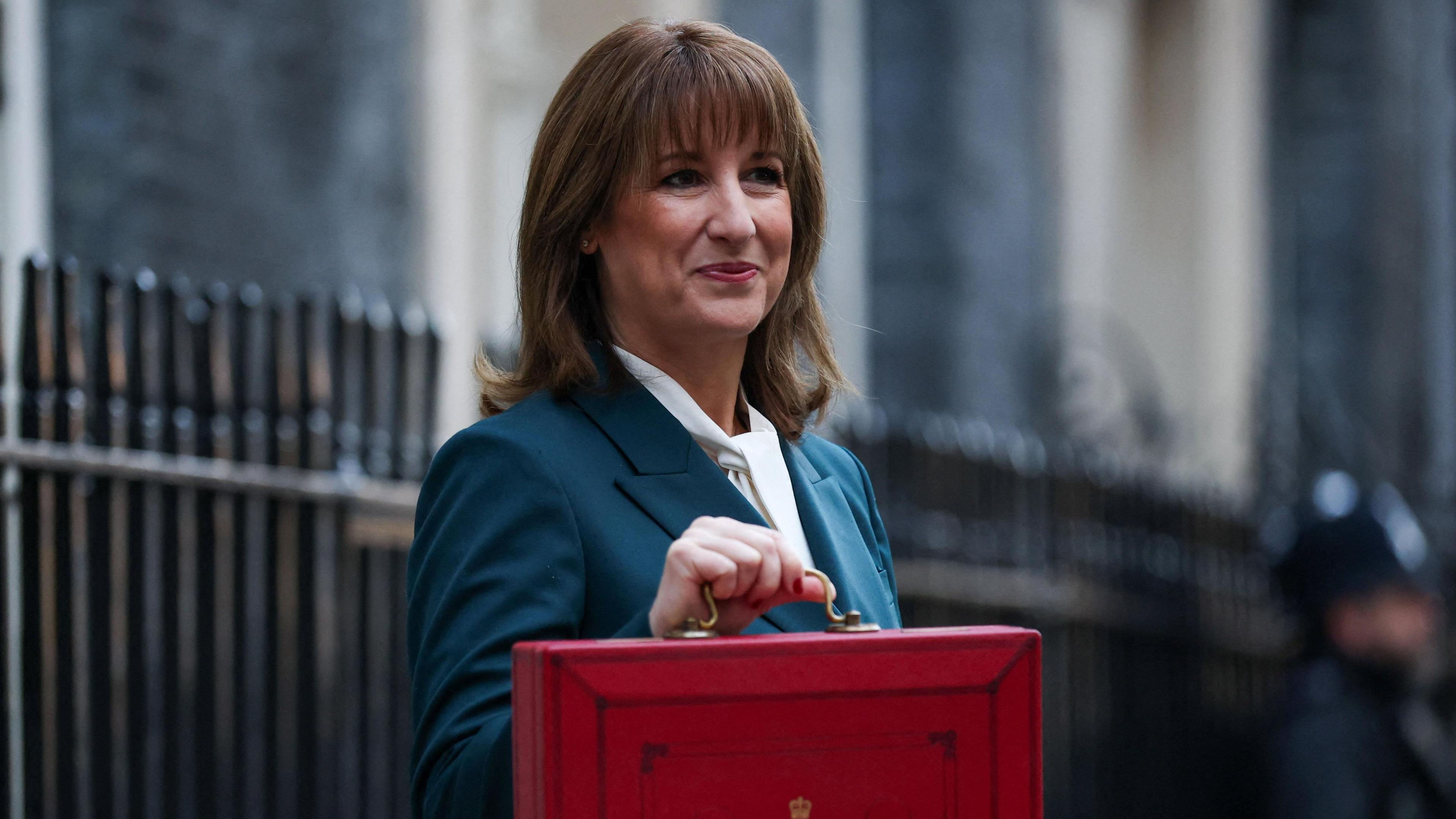Scotland to receive £820m boost from UK Budget

Chancellor Rachel Reeves announcer the UK Budget in the House of Commons
- Published
Scotland will receive an extra £820m by the end of the decade as a result of the UK Budget, Chancellor Rachel Reeves has announced.
The Labour minister also pledged to scrap the the two-child benefits cap for Universal Credit claimants.
However, her plans will lead to more Scots paying income tax and National Insurance, as well as introducing levies on pension contributions.
Scottish Finance Secretary Shona Robison said the extra funding was a "small amount" that would not meet the pressures faced by her government.
Announcing the £820m for the Scottish government - which has an annual budget of about £60bn - Reeves said: "The benefits of investment and growth must be built and felt in every part of the United Kingdom."
She described her tax changes as "pragmatic".
Labour ministers are also set to loosen rules on new oil and gas exploration in the North Sea, though they have been urged to go further and scrap a windfall tax on energy giants.
Robison accused the chancellor of presiding over a "chaotic" process after the Office for Budget Responsibility accidentally revealed the key details of announcement before the announcement.
The finance secretary told BBC Scotland News that proposals to reduce energy bills were "disappointing".
She criticised the continuation of the energy windfall tax - and said Labour ministers had to be "pushed" into scrapping the two-child benefits cap.
Robison refused to be drawn on her plans for the Scottish Budget after being asked if she could rule out income tax rises north of the border.
While some of the tax and spending decisions in the UK Budget do not directly affect Scotland - which has control in devolved areas such as health and education and sets its own income tax rates - many of the measures do.
Ahead of the Budget, the chancellor had already announced an increase in the minimum wage and an extension of the sugar tax - both of which apply across the UK.
Reeves also confirmed £20m of investment for Inchgreen dry dock in Inverclyde, and a further £20m for the redevelopment of Kirkcaldy town centre and seafront, which is to begin next year.
Income tax freeze - and how it affects Scots
Reeves announced that a freeze on UK income tax thresholds will be extended until 2030.
Scotland sets its own income tax rates and bands, but changes to thresholds do have an impact north of the border.
Holyrood ministers have used their devolved powers to set up a distinct system, with seven bands to the UK's four.
The Scottish government is in charge of setting the thresholds for all of these bands except for the lowest one, the personal allowance, which is the level at which people start paying tax.
Extending the freeze on this threshold means that as salaries rise over time, more people reach an income level at which they start paying tax.
As well as directly affecting the take-home pay of Scots through the personal allowance, the change will also lead to an automatic deduction from the block grant that the Treasury pays to the Scottish government.
This is because the UK government is able to deduct funds from the block grant that it estimates it would have received if tax-raising powers were not devolved to Holyrood.
Frozen thresholds mean more taxpayers paying higher rates in other parts of the UK, and a higher theoretical tax take for the UK government in Scotland - and therefore a bigger deduction from the block grant.
Another of the key Budget announcements was on the two-child benefits cap, which means that parents can only claim Universal Credit or tax credits for their first two children, with a few exemptions.
Introduced by the Conservative party to cut costs, the cap has so far been kept in place by Sir Keir Starmer's Labour administration.
But Reeves confirmed that the cap on Universal Credit would be lifted from April. The UK government said the move would benefit 95,000 children in Scotland.
The chancellor said her government did "not believe that the solution to a broken welfare system is to punish the most vulnerable children".

The Scottish government says the move will lead to 20,000 fewer children living in relative poverty
She added that her government would removed the "vile, dehumanising and cruel" rape clause.
The Scottish government has pledged to mitigate the cap north of the border by offering a new benefit - the Two-Child Limit Payment - to affected families from March next year.
The UK government's decision to scrap the cap is expected to save the Scottish government about £155m in the next financial year.
However, the Fraser of Allander Institute, an independent economic research unit at the University of Strathclyde, has estimated, external that scrapping the cap could cost the Scottish government an additional £34m in 2026-27 because it would mean more people were eligible for devolved benefits.
Taken together, that would leave Holyrood with a saving of £121m.
First Minister John Swinney has pledged to use any savings from the removal of the cap to tackle child poverty.

Shona Robison accused the UK government of breaking promises
Responding to the UK Budget, Robison said: "We needed a step change from the UK government with investment in public services, support for jobs and industry in Scotland and serious action on energy bills.
"Instead, we got a chaotic mess and the increase in funding for the Scottish government will not even cover half the cost of the employer's National Insurance contributions brought in this year."
Scottish Conservative leader Russell Findlay said: "Labour's £26bn tax bombshell continues their sustained attack on hard-pressed workers and businesses."
Scottish Green co-leader Ross Greer said: "This was a badly missed opportunity and a lesson in mediocrity. Labour promised little and delivered even less."
The Budget offered "precious little" on how to grow the economy, support industry and invest in public services, according to Scottish Liberal Democrat economy spokesman Jamie Greene.
However, Scottish Labour leader Anas Sarwar said: "This budget means child poverty down, energy bills down, wages up and austerity rejected."
When is the Scottish Budget?
The block grant paid to the Scottish government by the UK Treasury is adjusted relative to what is spent on devolved services like health and education in England.
The calculation to decide Scotland's share is based on population and some other factors.
The Scottish government will announce its own tax and spending plans on 13 January - a month later than usual because the UK Budget was pushed back to November.
Coming just four months before May's Holyrood election, it is expected to be a key staging post in the battle for votes.
- Published4 hours ago
